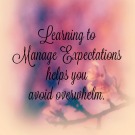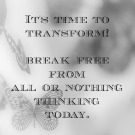Are you struggling to find greater meaning in your life? Are you consumed by your daily life only to wonder if you’re missing out, or if there’s something “more” meant for you?
Finding meaning comes from many things; it can come from rocking your day to day to-do’s, but it can also come from making sure you take time along your journey to enjoy and check-in with yourself.
Finding meaning can be found in both the big and small moments of life.
Because life can be hectic, it’s sometimes challenging to intentionally get in touch with what is meaningful to you, and if you’re truly living in alignment with what brings you the most joy, satisfaction, and fulfillment. There are three powerful keys to help you figure out if you’re on the right track or if you need to change course, and they are: contemplation, focus, and practice.
Contemplation
Our modern world wants us to GO. It wants us to be “productive” and “effective.” And while being productive and effective are, in and of themselves good things, when we try to step away from them, we sometimes feel guilty. The problem is, if we don’t step away from time to time, we can’t reflect on whether our productivity and effectiveness are taking us where we want to go and making us feel how we most want to feel.
Stepping back and taking time for ourselves is critical because it’s in that “listening space” that we are most able to hear our inner voice. This voice speaks to us from a deeper place, beyond the rational thought that usually governs our days. Our inner voice can be smothered and stifled when it’s continuously ignored or relegated to last on our list. It’s in the quiet time of reflection that we’re able to hear what we need (which sometimes is radically different than what we want). It’s in this space of contemplation that we come to understand what our body, mind, and spirits truly need to live meaningfully and with purpose.
Whether we consciously know it or not, our inner voice has already assigned meaning to things. Trusting and knowing that our inner voice knows the answers helps us further solidify what is meaningful to us, regardless of what others think. Listening to and living by our inner voice are both radical acts of courage and compassion. But, if we don’t take time for contemplation, we miss our chance to listen and live courageously and compassionately.
Listening to our inner voice allows us to think and feel about things that we may not quite understand, and to trust that we’ll be shown clarity over time. Most importantly, this “listening space” holds the promise of change. If we allow ourselves time to “wander and ponder” mentally and emotionally, we can look at change in ways that aren’t so scary or overwhelming.
Contemplation also allows you to figure out three crucial things:
- What are your values?
- What rewards you most?
- Are your priorities in alignment with your values, and what rewards you most?
Living life out of sync with your values and what rewards you is frustrating, defeating, and discouraging. It’s also a life usually without much meaning. Taking stock of values and rewards helps you tap into how you want to feel and live each day.
You’ll know if you’re living your values and doing things that reward you by how you feel. If you don’t feel jazzed most of the time, chances are you need to look at your priorities and see where you can start spending more time on things that are truly important and rewarding to you.
I am not afraid of storms for I am learning to
sail my ship.
-Louisa May Alcott
One of the most important questions you can ask yourself at any given time is: who’s steering your ship? Remember: you always have choice and influence in how you respond to what’s going on in your life. If you’re not experiencing as much meaning as you’d like, ask yourself why not. Do you need to set a time and energy boundary first with yourself and then with others? Do you need to have a conversation with someone? If you’re not experiencing the meaningful life you know you’d love, it’s time to get curious as to how you can make new decisions to experience a different life, starting today.
Focus on the Past, Present, and Future
All we have is the present moment. And, when we’re in the present moment, we can choose whether that moment is meaningful or not. But sometimes, we fixate a little too long on the past or look a little too longingly to the future.
As we mature, grow, and evolve, what brings us meaning evolves too. We may still enjoy activities from our past, but we may find that some no longer serve us. There’s an art to taking from the past, thinking about the future, and living in the moment. It’s dancing with all three that can help us appreciate where we’ve come from, live in this moment, and look forward in a healthy way to what’s to come.
Meaning is always what you make of it.
Honoring the past and looking forward without longing or attachment allows us to appreciate the now and find meaning in the present. Looking at all three – the past, the present, and the future – as opportunities to grow allows us to be grateful. We may have come through terribly hard times, but hopefully, we’ve learned from those and have used those experiences to make us stronger, healthier, and more self–aware. Those hard times can also help us appreciate the now and make sense of where we want to go in the future. Gratitude for the past, present, and future grounds us a positive place where we can look back, look forward, and also focus on what’s in front of us in this moment.
Develop a Meaning Finding Practice
Developing a Meaning Finding Practice can be viewed as a fun way to make sure you take time for contemplation, focus, and realignment. It’s a place where you set the rules and where you discover your ARK’s.
ARK, as we all learned in the movie Evan Almighty, stands for Act of Random Kindness. You probably will find meaning through ARKs every day, whether they’re done for you or someone else. Aim to have a balance of self ARKs and ARKs for others. Also remember, something that seems small to you may seem monumental to someone else. So when you think an ARK may be too small, think again.
Here is an example of how to set up a Meaning Finding Practice:
- Try to set aside at least 30 minutes once a month for contemplation.
- Remember that this practice is supposed to feel supportive and FUN. Approach your practice with a curious mind and sense of adventure. What environment do you need to feel supported, relaxed, and able to tune into your inner voice?
- Make a list of your top 5 values. Core values tend to be stable over time, but you may find some values changing over time.
- Go back over your last 30, 60, or 90 days and note down when you felt most in alignment with your values. What were you doing? Who were you with? What were you feeling?
- Reflect on the experiences that reward you most and jot them down.
- Go back over your last 30, 60, or 90 days and note down when you felt most rewarded. What were you doing? Who were you with? Where were you? Other than rewarded, what else did you feel during that time?
- How can you shift your priorities to include more value-affirming and rewarding experiences in your life?
- Reflect back over your last 30, 60, or 90 days and note down when you were most frustrated or discouraged. What were you doing? Who were you with? Where were you? Other than frustrated and / or discouraged, what else did you feel during that time?
- For those times you were frustrated or discouraged, note down how those situations clashed with your values.
- For those times you were frustrated or discouraged, note down one to two ways you can use your power of choice and influence to change how you respond to similar situations when they come up in the future. Do you need to set a boundary or have a conversation? Do you need to minimize or eliminate an activity if possible? How can you look at those situations from a different point of view?
- End your practice by saying a silent gratitude mantra such as, “I am grateful for this moment and for having this time to reflect on the meaning in my life.”






